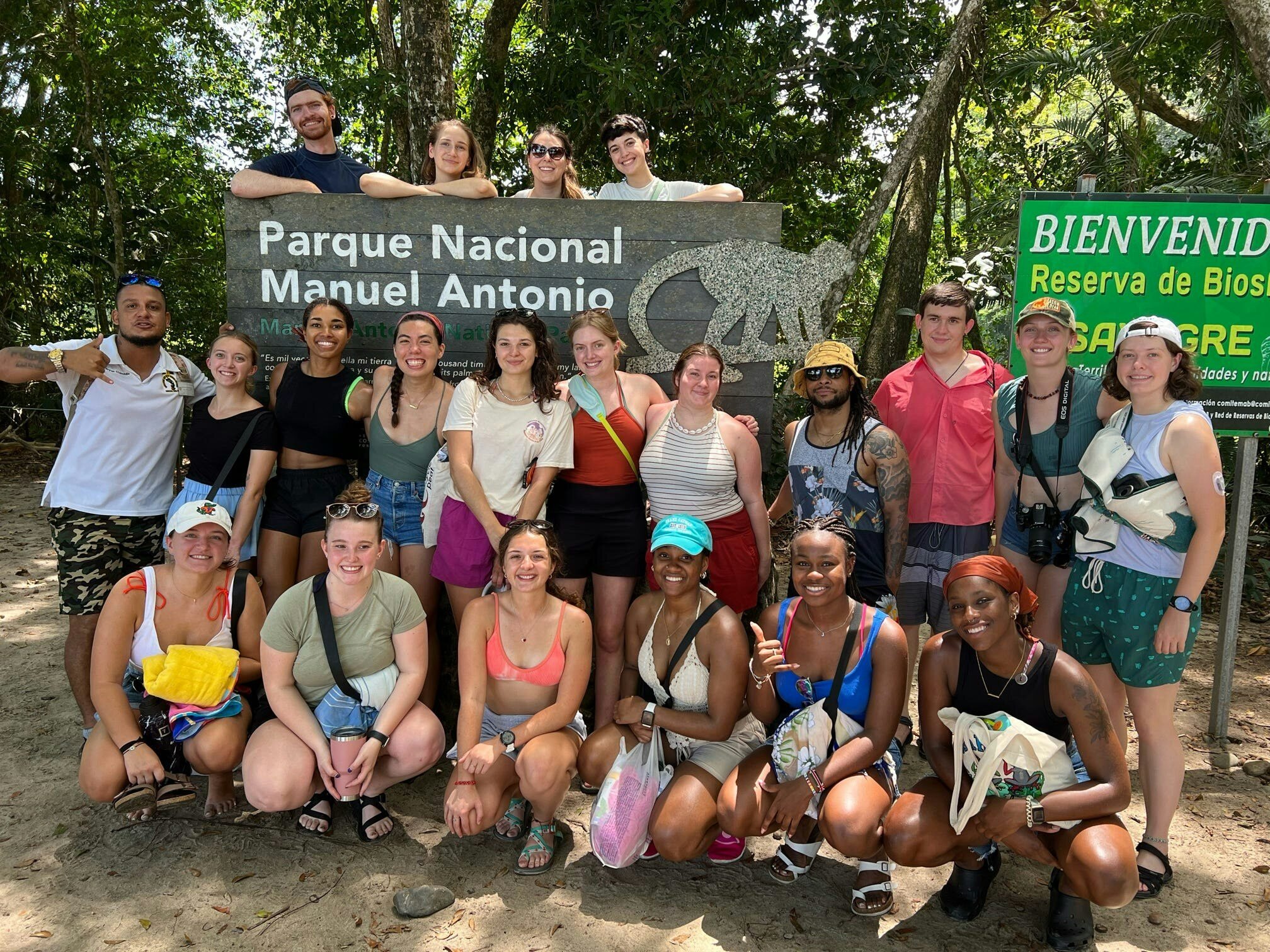
Katie Fassbinder, CISabroad Program Manager and returned Peace Corps Volunteer, manages study and intern applications in Ghana, Oman, South Africa, Costa Rica and January Multi-Country. Which destination will you choose this academic year?
All study abroad is unique, whether it be that time you spent 10 months tasting your way through the markets of Bangkok or two weeks on a faculty-led field course to Paris. Most time well spent overseas will broaden your perspective, give you more insight into a different culture and history, and build your self-awareness of your role in a changing world. Many students this term will chose to go someplace they have heard of, somewhere familiar to them at least from books and films, because let’s face it--being away from family and friends alone for four months can be terrifying! It can, also however, bring you a life-changing experience--one that will, for example, change your path from studying politics in Iowa, to joining the Peace Corps, working in Turkey, and studying Mandarin in your free time. I implore you, however, to consider choosing a destination that might not have crossed your radar--for only the reason that you’ve never heard of it. Here’s why…
 1. You will learn and experience things you can’t get from books and movies. Did you know that every year you can watch thousands of sea turtles migrate from the Arabian Gulf, the Red Sea, and Somalia to lay their eggs on Oman’s shores? Or that South Africa’s Stellenbosch has vineyards that rival Napa Valley at a fraction of the price? Have you heard of the Wli waterfalls in Ghana, where you can swim surrounded by butterflies?
1. You will learn and experience things you can’t get from books and movies. Did you know that every year you can watch thousands of sea turtles migrate from the Arabian Gulf, the Red Sea, and Somalia to lay their eggs on Oman’s shores? Or that South Africa’s Stellenbosch has vineyards that rival Napa Valley at a fraction of the price? Have you heard of the Wli waterfalls in Ghana, where you can swim surrounded by butterflies?
2. There are fewer tourists off the beaten path. Some students wish to immerse themselves in the unknown and live like a local. This can be hard to do if all of your flatmates are American, and you find yourself surrounded by Americans at every destination. If you are thinking of going to a country you suspect might bring in a handful of tourists--or ten, try picking a city outside of the capital for your stay. Often times, you’ll feel more integrated and less like a tourist in a smaller town like Aix en Provence over, say, Paris. Not to mention what it will do for your language skills. (Don’t worry, you can still go to Paris on the weekends!)
3. You will develop marketable expertise and language skills. Some of us are still struggling with Spanish after four years. But fear not--nontraditional doesn’t necessarily mean non-English speaking! You can get by in most places with pointing, grunts, and nodding, but there are many countries you might not expect where English is the official language, or at least the language of instruction in universities. For those who have mastered their high school Spanish and are looking for a new challenge--why not check out Xhosa, Twi, or Arabic? Future employers in all fields will see that additional language on your resume as your time devoted to self-discipline, and more customers or a new market they can reach. And nontraditional languages? Master one of those and some people in the government may be using you as their next translator. *Note: Smiles are universal.
 4. There are often more financial aid and scholarships up for grabs. The Benjamin A. Gilman International Scholarship and the Boren both award students for learning less commonly taught languages in underrepresented study abroad locations. There are also loads of scholarships available at your home university and less typical study abroad countries’ universities to encourage students to apply. Not to mention, if you apply to the same program or destination as many other people from your school, you are less likely to get funding just because it’s automatically more competitive. For a list of more scholarship opportunities, click on CISabroad Scholarship website, and talk or chat with a CISabroad advisor.
4. There are often more financial aid and scholarships up for grabs. The Benjamin A. Gilman International Scholarship and the Boren both award students for learning less commonly taught languages in underrepresented study abroad locations. There are also loads of scholarships available at your home university and less typical study abroad countries’ universities to encourage students to apply. Not to mention, if you apply to the same program or destination as many other people from your school, you are less likely to get funding just because it’s automatically more competitive. For a list of more scholarship opportunities, click on CISabroad Scholarship website, and talk or chat with a CISabroad advisor.
5. Speaking of funding...Studying outside of major cities, popular destinations, tourist hubs, (or outside of Europe in general) means cheaper prices and better cost of living. Your money will go much further in Quito than it will in London, which means more traveling, better eating, cheaper textbooks, and more pocket money. Spending all your student loan money on housing is no fun, especially when as a student on a budget, Taco Bell can pass as an appropriate date night.
6. Surprising luxuries and comforts. You may not get the kind of luxury you’re used to here in the U.S., but you can find the comforts of home anywhere if you try. This especially helps if you have good friends and a supportive host family (if you chose). You may be surprised to know also that you can find a KFC or McDonald’s in just about every country in the world. And, depending on your budget, some of you may be able to live even better abroad than you can as a student in the U.S. But, even if by chance you had to go without hot water for a few weeks, wouldn’t it be worth it if you could swim in the ocean every day?
 7. Hospitality, a home away from home--and a healthy routine. Chances are, less visited towns will want to know why you, yourself, are visiting! Places full of tourists can often be more expensive and a little burnt out by the comings and goings of nonfamiliar people, but someone new in a smaller town often brings about a sense of curiosity and friendliness in the locals that you should take advantage of! Use this chance to meet new people, make new friends, break old habits, and develop a well-rounded routine. Practice your language, learn an instrument, study at the local coffee shop, go hiking with some students in your classes, and invite your neighbors over for a meal!
7. Hospitality, a home away from home--and a healthy routine. Chances are, less visited towns will want to know why you, yourself, are visiting! Places full of tourists can often be more expensive and a little burnt out by the comings and goings of nonfamiliar people, but someone new in a smaller town often brings about a sense of curiosity and friendliness in the locals that you should take advantage of! Use this chance to meet new people, make new friends, break old habits, and develop a well-rounded routine. Practice your language, learn an instrument, study at the local coffee shop, go hiking with some students in your classes, and invite your neighbors over for a meal!
8. Get to know yourself. There is no wrong study abroad. Living anywhere new can (and will) test your patience. It may seem difficult to understand the system of traffic in Thailand, why they drive on the left side of the road in South Africa, and how to queue in China. But testing your patience will often increase it, and opens you up to a whole new way of living, thinking, and learning in this world. As you might have heard, a life unexamined isn’t worth living (Socrates), and if you’re examining a very different place, you’ll spend a lot more time thinking about how we do it too, and maybe how together we can make the world a better place.
9. Expectations are never as you expect. Embrace the unknown. Your study abroad will not be exactly as you picture it. Your housing will not be the same as it is at your home university. Your classes might be easier, harder, or a different kind of pedagogy than you’re used to. Your host family may be atypical. Your new peers could may do things a bit differently. That’s the beauty of study abroad. You’ll never know until you get there. If you assume everything will pan out like Eat, Pray, Love or Amélie, you may be setting yourself up for disappointment. With all programs, keep an open mind and make sure that you are choosing a program that fits your academic needs and budget. Everything else will fall into place.
 10. You may never have a reason or another opportunity. What reason will you ever have to go to Muscat, Oman? When will you get another chance to see such important student movements in South Africa? Wouldn’t it be great to get credit for studying Spanish in a place where people actually speak Spanish? Why not intern in China now rather than later? You may be able to get a cheap flight to London or Rome to see the sights someday, but when else will you be able to say that you spent four months in Cusco, absorbed in the culture, in love with your host family, and walked the Inca Trail?
10. You may never have a reason or another opportunity. What reason will you ever have to go to Muscat, Oman? When will you get another chance to see such important student movements in South Africa? Wouldn’t it be great to get credit for studying Spanish in a place where people actually speak Spanish? Why not intern in China now rather than later? You may be able to get a cheap flight to London or Rome to see the sights someday, but when else will you be able to say that you spent four months in Cusco, absorbed in the culture, in love with your host family, and walked the Inca Trail?
After graduation we swear to ourselves: we’ll get there, we can afford it then, but the truth is--it can be harder to do, and much harder to justify without the academic credit and financial aid. Any experience abroad can be worthwhile and something you carry with you the rest of your life. Don’t rule out a country just because you don’t know too much about it. I guarantee if you spend a little time on google and talking with an advisor, you’ll have a lot to look forward to in any country. Now is the time to use your independence and choose your own adventure. Try something new and remember to lean into your discomfort-it’s where the magic happens!
 One of the most important decisions in your academic tenure is the decision to study abroad. CISabroad, a commitment partner with IIE, encourages you to become a part of #GenerationStudyAbroad. Whether you choose a non-traditional location or not, CISabroad is here to help you reach your academic and global potential abroad. Which road will you travel?
One of the most important decisions in your academic tenure is the decision to study abroad. CISabroad, a commitment partner with IIE, encourages you to become a part of #GenerationStudyAbroad. Whether you choose a non-traditional location or not, CISabroad is here to help you reach your academic and global potential abroad. Which road will you travel?










 One of the most important decisions in your academic tenure is the decision to study abroad. CISabroad, a commitment partner with IIE, encourages you to become a part of #GenerationStudyAbroad. Whether you choose a non-traditional location or not, CISabroad is here to help you reach your academic and global potential abroad. Which road will you travel?
One of the most important decisions in your academic tenure is the decision to study abroad. CISabroad, a commitment partner with IIE, encourages you to become a part of #GenerationStudyAbroad. Whether you choose a non-traditional location or not, CISabroad is here to help you reach your academic and global potential abroad. Which road will you travel?